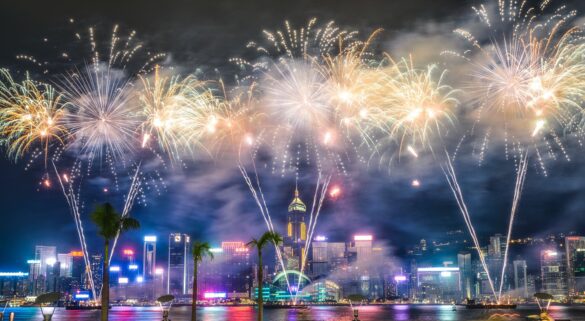Cambodia, a Southeast Asian country noted for its rich history, beautiful temples, and vibrant culture, also hosts a number of brilliant and colorful festivals and celebrations. These activities provide tourists with a one-of-a-kind opportunity to immerse themselves in local traditions and experience the authentic spirit of Cambodia. Here are the finest festivals and festivities to visit in Cambodia, ranging from religious rites to cultural presentations.
Khmer New Year (Chaul Chnam Thmey):
The Khmer New Year, celebrated in mid-April, is one of Cambodia’s most important celebrations. According to the Khmer lunar calendar, this three-day celebration marks the end of the harvesting season and the beginning of the New Year. Locals participate in a variety of activities, such as visiting pagodas, playing traditional games, and having water battles. Colorful processions and traditional music and dance performances fill the streets. It’s a terrific opportunity to witness the Khmer people’s joyous energy and hospitality.
Bon Om Touk (Water Festival):
Bon Om Touk, commonly known as the Water Festival, is an annual event held in November. This three-day festival marks the end of the rainy season and the reversal of the Tonle Sap River’s flow. The boat races, in which teams from all across the country compete in traditional longboats, are the festival’s highlight. Thousands of residents and tourists flock to the riverbanks to cheer on their favorite teams. Aside from the boat races, there will be fireworks, live music performances, and vivid parades highlighting Cambodia’s rich cultural history.
Pchum Ben (Ancestors’ Day):
Pchum Ben, or Ancestors’ Day, is a religious celebration celebrated in September or October. This celebration lasts 15 days and is dedicated to honoring and paying reverence to deceased ancestors. Cambodians travel to pagodas and offer food and prayers to their ancestors in order to help them find peace in the afterlife. The final day of the celebration is the most important, with people rising early to present sticky rice and other sweets to the monks. During Pchum Ben, the atmosphere is solemn yet filled with a sense of unity and reverence.
Angkor Wat International Half Marathon:
For runners, the Angkor Wat International Half Marathon is a must-do event. This marathon, held every December, attracts runners from all over the world who run through the majestic temples of Angkor Wat. There are several race categories available at the marathon, including a 21-kilometer half marathon, a 10-kilometer race, and a 3-kilometer family run. Not only does the event promote fitness and camaraderie, but it also raises funds for various charitable causes in Cambodia.
Royal Ploughing Ceremony:
The Royal Ploughing Ceremony is an old agricultural ceremony that takes place at the Royal Palace in Phnom Penh every May. The King of Cambodia presides over this ancient event, which marks the start of the rice growing season. During the celebration, two sacred oxen are fed a variety of foods such as rice, corn, and beans. The crops that the oxen select are thought to predict agricultural abundance for the coming year. Colorful processions and traditional performances accompany the occasion, providing a look into Cambodia’s royal heritage.
Chaul Chnam Khmer (Khmer New Year):
In addition to the national Khmer New Year, the Khmer ethnic minority celebrates the Chaul Chnam Khmer, which falls in mid-April. This celebration offers a rare glimpse into Khmer culture, traditions, and customs. Music, dance, and vivid decorations fill villages and towns across the country. The traditional game of “Teanh Prot,” a type of wrestling that symbolizes the triumph of good over evil, is a prominent highlight. Visitors can take part in the festivities, eat traditional Khmer dishes, and observe the Khmer people’s strong communal spirit.
Visak Bochea (Buddha’s Birthday):
Visak Bochea, also known as Buddha’s Birthday, is a major religious event observed by Cambodian Buddhists. It is traditionally celebrated in May and honors Gautama Buddha’s birth, enlightenment, and death. Devotees flock to pagodas to offer flowers, candles, and incense, as well as to take part in religious rites. The nightly illuminated processions around temples, which create a tranquil and spiritual environment, are one of the most appealing spectacles. It is a time for introspection, meditation, and the spread of kindness and compassion.
Conclusion:
In conclusion, Cambodia is a country that comes to life during its festivals and celebrations. From the joyous water fights of Khmer New Year to the magnificent boat races of the Water Festival, each event highlights Cambodia’s rich cultural legacy and strong community spirit. Whether you’re experiencing the ancient rituals of the Royal Ploughing Ceremony or running the Angkor Wat International Half Marathon, these events provide a unique opportunity to participate in Cambodian traditions and customs. So, for an outstanding cultural experience in the Kingdom of Wonder, arrange your vacation around these top festivals and celebrations.

